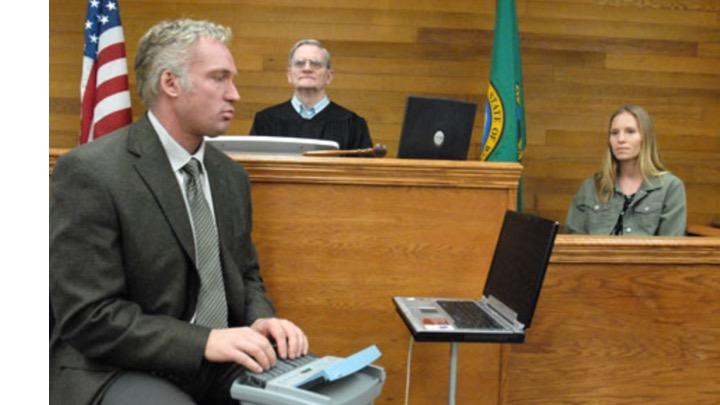Understanding the Importance of Court Coverage in Legal Services and Procedures
Court reporting plays a crucial function in the legal landscape, acting as the foundation of accurate paperwork in numerous legal process. By offering verbatim records, stenotype reporter make certain that every statement and disagreement is meticulously recorded, thus guarding the integrity of the judicial process. Past mere paperwork, their job sustains fairness and transparency, which are basic concepts of justice. The evolution of innovation and the honest implications surrounding this occupation elevate important questions concerning its future. What might these adjustments mean for the legal system and its stakeholders?
Duty of Court Reporters

In enhancement to transcription, court reporters are frequently tasked with managing and maintaining the flow of process. They have to be competent in legal terms and have a detailed understanding of court procedures to guarantee that the record mirrors the context and subtleties of the dialogue. Their work may additionally expand beyond conventional courtrooms, including administrative hearings, adjudications, and various other legal settings where documents is essential.
Moreover, stenotype reporter might supply real-time reporting, allowing immediate access to records throughout procedures, which can be crucial for the effective management of justice. By guaranteeing that an exact record is maintained, court press reporters maintain the stability of the legal process, offering and promoting charms as a vital resource for lawful professionals in their search of justice.
Significance of Precision

The duty of accuracy expands beyond simple transcription; it encompasses the capability to record the subtleties of speech, including tone, focus, and non-verbal cues, which can be critical in comprehending the context of declarations made. A specific document ensures that all events included-- attorneys, judges, and courts-- have access to the very same information, promoting fairness and transparency in the judicial procedure.
Additionally, exact records are important for the appellate process, where higher courts rely upon them to assess reduced court choices. Inaccuracies can threaten the end result of an allure, possibly affecting a celebration's legal rights and freedoms. Hence, the commitment to accuracy in court reporting is not simply an expert obligation but a cornerstone of justice that maintains the regulation of law.
Kinds of Legal Procedures
Covering a large array of legal contexts, stenotype reporter are important in numerous kinds of legal procedures, each needing distinctive techniques and abilities. Among the most usual kinds are civil lawsuits, criminal trials, and management hearings. In civil lawsuits, stenotype reporter record motions, depositions, and testaments, making sure that every information is documented precisely for possible charms or settlements.
In criminal trials, the role of stenotype reporter ends up being even more essential, as they transcribe all facets of the proceedings, including court choices, witness statements, and sentencing phases - Court Reporting. The precision and immediacy of these records are critical, given the potential effects for defendants and the stability of the judicial system
Management hearings, commonly conducted by governmental firms, additionally count on court press reporters to maintain official records of process. These hearings can include disputes relating to regulatory compliance, work concerns, or expert licensing, requiring specific documents.
In addition, specialized process such as arbitration and arbitration need court press reporters to record the nuances of settlements and arrangements. Each type of legal proceeding presents special difficulties, emphasizing the relevance of experienced court reporters in supporting the stability of the lawful process.
Innovation in Court Coverage
Advancements in technology have actually revolutionized the field of court reporting, enhancing both efficiency and precision in the transcription process. Traditional techniques of hands-on note-taking have been supplemented and, in many cases, changed by innovative electronic devices that streamline workflows and enhance precision (Court Reporting). Stenotype reporter now make use of innovative steno equipments equipped with real-time transcription capabilities, enabling prompt access to a verbatim account of process
Moreover, the combination of speech acknowledgment software application has actually additionally changed the coverage landscape. This technology allows the automatic transcription of talked words, considerably lowering the moment required for creating main records. Additionally, cloud-based platforms promote easy storage space and retrieval of records, making sure that lawyers can access vital documents from anywhere, at any kind of time.
Video clip conferencing tools have actually also arised as important parts in remote depositions and hearings, assisting court reporters record proceedings in real-time, despite location. address The mix of these technological advancements not only improves the accuracy of lawful documentation however also sustains a more versatile and reliable lawful process. As the area remains to advance, accepting these advancements will certainly be important in meeting the expanding demands of the lawful sector.
Ethical Considerations in Reporting
The combination of innovation in court reporting brings with it a collection of honest factors to consider that specialists should browse meticulously. As court press reporters significantly use digital devices, problems surrounding confidentiality, accuracy, and stability come to the leading edge. Protecting sensitive information is paramount; press reporters should make certain that any digital records are firmly kept and shared just with accredited people.
Moreover, the accuracy of transcriptions is crucial. Making use of software for real-time reporting does not absolve court reporters from the obligation of making sure that the last product is precise. Ethical responsibilities dictate that any mistakes must be quickly dealt with and connected to pertinent events.

Lastly, conformity with legal standards and industry regulations is vital. Court press reporters have to remain notified about evolving ethical standards to support the trust positioned in them by the lawful system. By attending to these honest factors to consider, stenotype reporter can continue to provide vital services in lawful process while preserving public confidence.
Verdict
In conclusion, court reporting plays an essential duty in the legal system by making certain exact and trustworthy paperwork of judicial process. The thorough work of court press index reporters promotes the stability of the legal procedure and supports the civil liberties of individuals involved.
Court reporting plays a pivotal function in the lawful landscape, serving as the foundation of exact documents in numerous lawful process.Court reporters consistently play an important duty in the judicial process by developing exact, verbatim records of lawful process.In addition, precise records are vital for the appellate process, where higher courts count on them to examine lower court choices.Treatment a broad selection of legal contexts, court reporters are important in various types of check my source lawful proceedings, each calling for unique techniques and skills. By dealing with these honest considerations, court reporters can continue to provide very useful services in legal proceedings while preserving public confidence.
Comments on “Court Reporting Solutions-- What You Need to Know for Legal Instances”